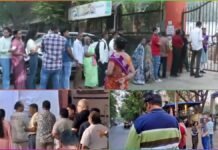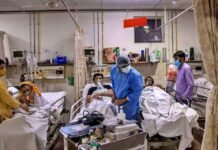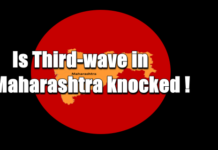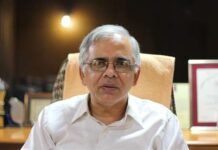
New Delhi: An expert committee constituted by an institute under the Union Home Ministry has expressed apprehension that the third wave of Covid-19 (3rd Wave of Covid In India) may occur in the country anytime between September and October. The report has suggested speeding up the pace of vaccination in India. The expert committee constituted by the National Disaster Management (NIDM) has also said that children will be at the same risk as adults because of the availability of pediatric hospitals, doctors, and equipment like ventilators, ambulances, etc. in case a large number of children get infected. It May not meet demand.
The report submitted to the Prime Minister’s Office said that only 7.6 percent (10.4 crores) of people in India have been fully vaccinated and if the current vaccination rate is not increased, then the next wave of epidemic in India will be six lakh per day. Cases may come up. The report says, “Eminent experts have repeatedly warned of an imminent third wave of Covid-19 in India. Epidemiologists have expressed apprehension that until we develop widespread immunity through vaccination or infection, cases will continue to increase.
The peak of the third wave may come in October
The NIDM report cited the estimates of experts from IIT Kanpur which suggests three possible scenarios for the third wave. He said that in the first scenario, the third wave could peak in October and there could be 3.2 lakh cases daily. In the second scenario, a new and more infectious form of the virus may emerge and the third wave may reach its peak in September with five lakh cases expected per day.
Experts have expressed apprehension in the third scenario that the peak of the third wave will come by the end of October and two lakh cases may come daily. According to the report, it proposed that if 67 percent of the population develops immunity against the virus (some through the virus and the rest through vaccination), the goal of achieving large-scale immunity should be achieved. can be obtained.

It has become complicated after new and more infectious forms of SARS Cove-2 have emerged because these forms of the virus have the ability to evade immunity built up from earlier infection, as well as in some cases it can be present. Vaccines can also be avoided. According to the report, because of this, the target of developing immunity on a large scale can be achieved only when 80-90 percent of the population develops immunity.
Children may be at risk
The report said that there is not enough data to support the widespread fears that children will be more severely affected in the third wave of the pandemic. It said that there could be a big challenge for children, as no vaccine has been approved for children in India so far (first week of August).
Generally, children may not show signs of coronavirus infection or show minor symptoms, but it can become a cause of concern for children who have a disease or their immunity is weak. According to the Ministry of Health and Family Welfare, 60-70 percent of the total children admitted to the hospital due to Covid-19 had a pre-existing disease or their immunity was weak. According to the Ministry’s Kovid Vaccination Dashboard, more than 47 crore people have been given at least one dose of anti-Covid vaccine as of August 2, 2021.
According to a study conducted by professors and alumni of Pandit Deendayal Urja Vishwavidyalaya (PDEU) in collaboration with Nirma University, the vaccination rate in India is 3.2 percent and if it is not improved, then six per day in the third wave of the epidemic. There can be lakhs of cases.
















































